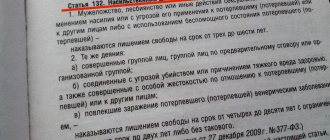Commentary to Art. 334 Criminal Code
1. The objective side of the crime consists of beatings (Article 116 of the Criminal Code) or the use of other violence, which is recognized as causing minor harm to health, restriction of freedom, etc. Such actions are committed against a superior during the performance of his military service duties or in connection with fulfillment of these duties. Thus, the commission of these acts under other circumstances not related to the performance by the chief of his military service duties will entail liability under other articles of the Criminal Code.
2. The act is completed from the moment the violent actions specified in the law are committed.
3. The subject of the crime is a military serviceman subordinate to a superior who has been subjected to violent acts.
Second commentary to Art. 334 of the Criminal Code of the Russian Federation
1. Violent actions qualified by Art. 334, can be committed due to the subordinate’s dissatisfaction with the official activities of the superior that took place in the past, or in connection with his specific actions performed at the moment.
2. Violence against a superior, which is a defense against unlawful actions on the part of the superior himself, excludes the liability of the subordinate under Art. 334 of the Criminal Code (Review of judicial practice of garrison military courts in criminal cases for the 1st half of 2014 // https://ovs.skav.sudrf.ru).
3. Violent actions against a superior, committed in the process of resisting him or forcing him to violate the duties of military service, are covered by Art. 333, such actions committed on the basis of personal relationships not related to the official activities of the boss should be qualified under the relevant articles of Chapter 16 of the Criminal Code.
4. According to Part 1 of Art. 334 qualifies beating a superior, causing minor harm to his health, as well as other violent actions associated with causing physical pain or restricting his freedom.
5. On the concepts of violent actions against a boss: by a group of persons, a group of persons by prior conspiracy and an organized group (clause a" part 2); with the use of weapons (clause “b”, part 2); with the infliction of grave or moderate harm to health or other grave consequences (clause “c”, part 2) see: commentary to Art. 333.
6. The subject of the crime is a military serviceman, by service or military rank, permanently or temporarily subordinate to the person against whom violent actions are committed.
7. The subjective side of the crime - guilt in the form of direct intent
This group of crimes includes failure to comply with an order, resistance to a superior, violent actions against him, violations of statutory rules of relationships, insulting a military personnel (Articles 332-336 of the Criminal Code of the Russian Federation). What is common to all these types of acts is that they are carried out contrary to the statutory requirements that determine the content of military discipline and relations between military personnel, grossly violate the course of action normatively prescribed for the relevant cases, as a result of which significant harm is caused to the interests of the service or grave consequences occur.
Failure to comply with an order (Article 332 of the Criminal Code of the Russian Federation). The tasks of military service provide for the full responsibility of superiors (commanders) for the execution of orders and the corresponding powers, including the issuance of orders to subordinates, subject to immediate, precise, unquestioning execution. It is assumed that the order must be legal in form and substance. The Criminal Code of the Russian Federation exempts from liability a serviceman who did not carry out a knowingly illegal order. It seems that this provision (Article 42 of the Criminal Code of the Russian Federation) should now be interpreted in military legislation.
Failure to comply with an order may take the form of an outright refusal, actual non-execution, or improper execution. Criminal liability is borne by subordinates who did not carry out the order of their superior in cases where this caused significant harm to the interests of the service (disruption of a combat or other official mission, disablement of military equipment, violation of the rights and interests of citizens, undermining the readiness of other military personnel to carry out orders, etc.). d.). The concept of “failure to comply with an order” is evaluative in nature and is applied taking into account the specific circumstances of the case.
Part 1 art. 332 of the Criminal Code of the Russian Federation describes the main elements of the act and provides for fairly mild sanctions: restrictions on military service, arrest, detention in a disciplinary military unit. This article provides for two types of qualifying circumstances (Part 2): either a group nature of non-execution of an order (including an organized nature), or the infliction of grave consequences by the act. It seems that the “equation” by sanction of spontaneously occurring group disobedience to an order, disobedience by prior conspiracy and organized disobedience is a shortcoming of the law. As for “grave consequences,” we are talking about the death of people, the infliction of grave or moderate harm to health, the loss of military equipment, significant material damage, and finally, the loss of control of a unit (formation), etc.
If parts 1 and 2 art. 332 of the Criminal Code of the Russian Federation provides for liability for committing an act with direct or indirect intent, then Part 3 establishes liability for committing it through negligence, i.e. through frivolity or negligence, if this resulted in serious consequences. The sanction for failure to comply with an order due to negligence provides for restrictions on military service, arrest, and detention in a disciplinary unit. Deprivation of liberty, despite the grave consequences, is not provided for, however, such cases, depending on the circumstances of the case, may lead to classification in the aggregate.
Resistance to a superior or forcing him to violate the duties of military service (Article 333 of the Criminal Code of the Russian Federation). Resistance to both a superior and another person performing the duties of military service assigned to him (for example, a sentry) constitutes active resistance aimed at depriving him of the opportunity to perform official functions. Resistance may be a form of failure to comply with an order, but in this case we are talking about a set of actions. At the same time, a situation of resistance is not necessarily associated with failure to comply with an order given personally to the culprit; for example, it may be associated with opposition to entry into any premises, the use of military equipment, checking the condition of weapons, restricting access to the location of some unauthorized persons, etc. . A mandatory sign of resistance is the use of violence or the threat of violence.
The article in question also establishes liability for coercion in violation of military service obligations. If resistance is a kind of response to the actions or decisions of the person to whom it is applied, then coercion (it also involves violence or threat) is carried out in order to achieve the commission of illegal actions, for example, create a privileged position in the service, grant leave, etc. . Article 333 of the Criminal Code of the Russian Federation has two parts. The first describes the main composition; in the second – qualifying circumstances (group nature of the act, use of weapons, infliction of grave consequences). According to Part 1 of Art. 333 of the Criminal Code of the Russian Federation is subject to qualification of resistance and coercion associated with the threat of any violence, as well as physical violence in the form of beatings, causing minor harm to health, etc. Since the intentional infliction of grievous harm to health, provided for in Parts 2, 3, 4 of Art. 111 of the Criminal Code of the Russian Federation is a more serious crime; resistance or coercion associated with the intentional infliction of grievous harm to the health of a superior or another person should be qualified under the totality of Art. 333 and 111 of the Criminal Code of the Russian Federation.
From the subjective side, the act presupposes direct intent (in relation to the consequences, both indirect intent and double guilt are possible), but the corpus delicti of this crime exists only in the case of resistance to legal actions or coercion to illegal ones. Self-defense from actions that degrade honor and dignity, threaten to cause harm to health, loss of property, etc., does not entail criminal liability unless the limit of necessary defense is exceeded. Qualified composition (Part 2 of Article 333 of the Criminal Code of the Russian Federation) involves the commission of an act by a group of persons, a group of persons by prior conspiracy or an organized group; with the use of weapons; causing serious or moderate harm to health or other serious consequences.
Violent actions against a boss (Article 334 of the Criminal Code of the Russian Federation). The effect of this rule is limited to cases where violence is used during the performance or in connection with the performance of military service duties by the victim. In other cases (vacation, informal pastime, etc.), general rules on liability for violent crimes apply. Part 1 art. 334 of the Criminal Code of the Russian Federation means inflicting one or more blows that did not cause harm to health or caused only slight harm. The subjective side of the crime presupposes direct intent, but the motivation here is different compared to Art. 333 of the Criminal Code of the Russian Federation - resentment, revenge, and not the desire to interfere with the legitimate activities of the boss. The qualifying features of the crime (Part 2 of Article 334 of the Criminal Code of the Russian Federation) are similar to Part 2 of Art. 333 of the Criminal Code of the Russian Federation.
Violation of the statutory rules of relations between military personnel in the absence of subordination relations between them (Article 335 of the Criminal Code of the Russian Federation). Charters and other regulations governing military-service legal relations require mutual respect among military personnel and military courtesy; prohibit humiliation of the honor and dignity of military personnel. This is understandable: these requirements ensure the cohesion of personnel, readiness for mutual assistance and assistance when performing combat and other official missions, and the creation of an atmosphere of calm and security in the unit.
The act provided for in Art. 335 of the Criminal Code of the Russian Federation, refers to a violation of the specified statutory rules, consisting in the deliberate humiliation of honor and dignity, the mockery of some military personnel over others, and the use of violence. We are talking only about actions that: a) were committed by a person who, in relation to the victim, is neither a superior nor a subordinate (inconsistency of ranks in this case is not taken into account); b) committed within the scope of the statutory rules, i.e. during the performance of military service duties or in connection with their performance. While at a unit location, at a place of combat duty, exercises, etc., on a business trip or for treatment, a serviceman is considered to be performing military service duties.
Article 335 of the Criminal Code of the Russian Federation provides for liability for such actions as, for example, coercion in a cynical form to perform official duties for the guilty person, to be in his service, to transfer to him the personal belongings of the victim or military property assigned to him; forcing the victim to engage in behavior that disgraces him in the eyes of others, forcing him to engage in sexual contact, etc. These and similar bullying and harassment can have various motivations, including hooliganism. But the most typical reproduction of the traditions of the so-called hazing, i.e. self-affirmation of old-timers at the expense of newcomers and provision of a privileged position at the expense of the latter.
This article must qualify all violent and other actions committed against the victim, both while on duty and not on duty, but in connection with his official activities, when the perpetrator was on duty. Actions cannot be qualified under this article if they were committed on the basis of personal relationships without violating military law and order.
The qualifying circumstances of this crime are an attack on two or more persons, the commission of an act by a group of any kind or with the use of weapons (this also means demonstrating them to the victim), and causing moderate harm to health. Particularly qualifying circumstances (Part 3 of Article 335 of the Criminal Code of the Russian Federation) are grave consequences (murder, serious harm to health, desertion of the victim, his suicide or attempt on his life). If a criminal violation of the statutory rules of relationships is combined with intentional murder or intentional infliction of grievous bodily harm, as well as sexual assault or attacks on property, qualification is required for the totality of acts. The act provided for in Art. 335 of the Criminal Code of the Russian Federation (including those committed under qualifying or especially qualifying circumstances) is intentional. The perpetrator realizes that by his actions he humiliates the honor and dignity of the victim, mocks him, uses violence, and strives for this. In relation to the results of the use of violence, including the infliction of moderate harm to health, indirect intent is also possible. As for more serious consequences (Part 3 of Article 335 of the Criminal Code of the Russian Federation), it seems that there may be two forms of guilt here, and “in general, such a crime is recognized as committed intentionally” (Article 27 of the Criminal Code of the Russian Federation). Insulting a serviceman (Article 336 of the Criminal Code of the Russian Federation). The ingredients of an insult are described in Art. 130 of the Criminal Code of the Russian Federation. The specifics of the composition provided for in Art. 336 of the Criminal Code of the Russian Federation, consists in the presence of a special subject and a special victim, and also in the fact that this composition only covers insult by one military serviceman of another during the performance or in connection with the performance of military service duties. In this case, being at a unit location, a place where a combat or service mission is being performed, a medical institution, as well as en route to these places, as well as being in a guardhouse or in a prisoner of war camp is considered as the performance of official duties. The subjective side of the crime under Art. 336 of the Criminal Code of the Russian Federation, is characterized by direct intent. When comparing the contents of Parts 1 and 2 of Art. 336 of the Criminal Code of the Russian Federation, we can conclude that Part 1 refers to causing an insult in the absence of a relationship of subordination between the perpetrator and the victim. As a result, the effect of the main provisions of this article intersects with the effect of the main provisions of Art. 335 of the Criminal Code of the Russian Federation on liability for violation of the statutory rules of relationships. Insult is one of the cases of violation of statutory rules. Therefore, if there is a corresponding purpose, it is enough to qualify it under Art. 335 of the Criminal Code of the Russian Federation, which provides for a more severe punishment than Art. 336 of the Criminal Code of the Russian Federation. Qualified insult (Part 2 of Article 336 of the Criminal Code of the Russian Federation) refers to an insult by a subordinate to a superior, as well as by a superior to a subordinate. Therefore, this act is clearly distinguished from the act provided for in Art. 335 of the Criminal Code of the Russian Federation. Note that this composition equally protects both the boss and the subordinate. Unfortunately, a number of other articles in Ch. 33, for example art. 334 “Violent actions against a superior” of the Criminal Code of the Russian Federation, are constructed according to a different scheme: their use is limited to the task of protecting the superior. Therefore, his violent actions against his subordinates should be qualified under the article of the Criminal Code of the Russian Federation on abuse of official powers. It seems that amendments to the Criminal Code of the Russian Federation should be aimed at strengthening the protection of subordinates from illegal actions of superiors. It also seems that the task of restoring strict law and order in the army, without which it is impossible to increase the authority of military service, requires strengthening the sanctions provided for in the article in question.
See Also
Crimes against the performance of duty and military service obligations
Tags: discipline, military discipline, military service, crime
- 44-FZ VAT NDFL advance car alimony business marriage money children housing contract will housing plot property claim apartment benefit medicine management motivation tax taxes inheritance education clothing pensions pension payments purchase allowance bonus crime trial psychology work advertising deal family court tender labor accounting school
We greatly appreciate your comments. Thank you!
Comments for the site
Cackl e
Third commentary to Article 334 of the Criminal Code of the Russian Federation
1. The article provides for liability for violent actions against a superior during the performance of his military service duties or in connection with the performance of these duties. Violent actions are expressed in beatings, causing minor harm to health or committing other violent actions that cause physical pain (see commentary to Articles 115, 116). Violent actions provided for in this article are committed on the basis of dissatisfaction of a subordinate with the official activities of a superior, both at the present moment (during the performance of his military service duties) and in the past (in connection with the performance of these duties). The crime can be committed both on and off duty (for example, beating a squad commander for a penalty imposed upon meeting him on leave).
2. The subjective side of the crime is characterized by direct intent. The motives for violent actions are related to the official activities of the boss. Therefore, violence committed on the basis of personal relationships (personal hostility, jealousy, envy, etc.) should be qualified under the relevant article of Chapter 16 of the Special Part of the Criminal Code.
3. The subject of this crime may be a military serviceman subordinate to the person against whom violent actions are committed.
4. On the concept of qualifying circumstances provided for in Part 2 of this article, see the commentary to Art.
Art. 35, 111, 112, 333 CC. ‹ Article 333. Resistance to a superior or forcing him to violate the duties of military serviceUp Article 335. Violation of the statutory rules of relations between military personnel in the absence of subordination relations between them ›
Violent actions against a boss (Article 334 of the Criminal Code)
The victim is the chief (commander).
The objective side of the main element of the crime is the infliction of beatings or the use of other violence against a superior. These actions are performed during the performance of military service duties by the chief or in connection with the performance of these duties.
The composition type is formal .
From the subjective side, the crime is characterized by direct intent.
The subject is a military personnel subordinate to the victim.
Qualified composition (Part 2 of Article 334) provides for the same acts committed:
a) by a group of persons, a group of persons by prior conspiracy or an organized group;
b) using weapons;
c) causing grave or moderate harm to health or other grave consequences.
4. Violation of the statutory rules of relations between military personnel in the absence of subordination relations between them (Article 335 of the Criminal Code). The victim is a soldier.
The objective side of the main element of the crime is the violation of the statutory rules of relations between military personnel:
1) associated with humiliation of honor and dignity or mockery of the victim;
2) associated with violence.
The composition type is formal .
The subjective side presupposes direct intent.
The subject is a military serviceman who is not related to the victim by a relationship of subordination.
Qualified composition (Part 2 of Article 335) constitutes the same act committed:
a) in relation to two or more persons;
b) by a group of persons, a group of persons by prior conspiracy or an organized group;
c) using weapons;
d) causing moderate harm to health.
The onset of grave consequences is a sign of a particularly qualified crime (Part 3 of Article 335).
5. Insulting a military personnel (Article 336 of the Criminal Code). The victim in the main element of the crime is a military serviceman (who is not a superior).
From the objective side , the crime consists of insult by one military serviceman to another during the performance or in connection with the performance of military service duties.
The composition type is formal.
The subjective side is direct intent.
The subject is a military serviceman who is not in a subordinate relationship with the victim.
Victims of a crime under Part 2 of Art. 33 6, there can be either a superior (in case of insult by his subordinate) or a subordinate (in case of insult of the latter by his superior). Accordingly, the subject of this crime is either a subordinate (soldier) or his superior (commander).
§ 3. Crimes against the procedure for military service
1. Unauthorized abandonment of a unit or place of service (Article 337 of the Criminal Code). The objective side of the crime includes the following acts:
1) unauthorized abandonment of a unit or place of service;
2) failure to appear for duty on time without good reason upon dismissal from a unit, upon appointment, transfer, from a business trip, vacation or medical institution.
Leaving a unit or place of service should be understood as the departure of a serviceman outside the territory of the unit in which he is serving, or leaving a place of service that does not coincide with the location of the unit (for example, the location of the serviceman on a business trip or the place of his treatment). If the units of one unit are located separately, the leaving of the unit by the military personnel should be recognized as leaving the unit, and not the place of service.
Leaving a unit or place of service by a serviceman undergoing military service on conscription without the appropriate permission of the commander (superior) is considered unauthorized.
Failure to appear for service on time without good reason for military personnel undergoing conscription military service should be understood as the failure of these persons upon dismissal from a unit, upon assignment, transfer, from a business trip, vacation or medical institution to serve within the period established in the relevant documents (for example , in a dismissal note, vacation ticket).
If the specified acts were committed over a period of more than two days, but not more than 10 days, liability arises under Part 1 or Part 2 of Art. 33 7 (depending on the subject of the crime).
Unauthorized abandonment of a unit or place of service, as well as failure to appear on time without good reason for service lasting more than 10 days, but not more than one month, is qualified under Part 3 of Art. 33 7, and for a duration of more than one month - under Part 4 of Art. 33 7.
The crime has a formal composition.
The subjective side is direct intent.
The subjects of the crime are:
- a serviceman undergoing military service upon conscription ( Part 1, Article 337);
— a serviceman serving a sentence in a disciplinary military unit ( Part 2 of Article 337);
- a serviceman undergoing military service by conscription or contract ( Parts 3 and 4 of Article 33 7). A serviceman who committed the acts provided for in Art. for the first time. 337, may be exempt from criminal liability if they were the result of a combination of difficult circumstances (note to Art. 337).
combination of difficult circumstances should be understood as objectively existing at the time of unauthorized leaving the unit (place of service) unfavorable life situations of a personal, family or service nature, perceived by the serviceman as negative circumstances, under the influence of which he decided to commit a crime. These may include, in particular, such life circumstances that necessitate the immediate arrival of the serviceman to the location of close relatives (serious health condition of the father, mother or other close relatives, funeral of these persons, etc.) or significantly complicate his stay in the unit ( at the place of duty) for various reasons (for example, due to hazing against a serviceman, inability to receive medical care).
2. Desertion (Article 338 of the Criminal Code). The objective side of the crime provided for in Part 1 of Art. 338, are:
1) unauthorized abandonment of a unit or place of service;
2) failure to appear for duty.
The crime is ongoing and has a formal composition.
The subjective side is characterized by direct intent and purpose of evading military service. Intent to desert may be evidenced by such circumstances as the acquisition or production by a person of false identification documents or evidence that the citizen has served the statutory period of military service or has a deferment from conscription, employment, etc.
The subject of the crime is a military serviceman. A serviceman who committed desertion for the first time under Part 1 of Art. 338, may be exempted from criminal liability if it was the result of a combination of difficult circumstances (note to Art. 338).
combination of difficult circumstances should be understood as objectively existing at the time of unauthorized leaving the unit (place of service) unfavorable life situations of a personal, family or service nature, perceived by the serviceman as negative circumstances, under the influence of which he decided to commit a crime. These may include, in particular, such life circumstances that necessitate the immediate arrival of the serviceman to the location of close relatives (serious health condition of the father, mother or other close relatives, funeral of these persons, etc.) or significantly complicate his stay in the unit ( at the place of duty) for various reasons (for example, due to hazing against a serviceman, inability to receive medical care).
The signs of a qualified crime (Part 2 of Article 338) are:
a) desertion with weapons entrusted to the service;
b) desertion committed by a group of persons by prior conspiracy or by an organized group.
3. Evasion of military service duties by feigning illness or other means (Article 339 of the Criminal Code). The objective side of the main element of the crime is evasion from performing military service duties. methods are:
— simulation of illness;
— causing any damage to oneself (self-mutilation);
- forgery of documents;
- another deception.
The crime has a formal composition.
The subject is a military personnel.
The subjective side is characterized by direct intent. For a qualified crime (Part 2 of Article 339), the purpose of evasion is also mandatory - complete exemption from performing military service duties.
§ 4. Crimes against the procedure for performing special services
1. Violation of the rules of combat duty (Article 340 of the Criminal Code). The objective side of the main element of the crime (Part 1 of Article 340) consists of violating the rules of combat duty (combat service) to timely detect and repel a surprise attack on the Russian Federation or to ensure its security.
The type of composition is material-formal . The crime is considered completed if the act:
— caused harm to the security interests of the state;
- could result in harm to the security interests of the state.
The objective side of the crime provided for in Parts 2 and 3 of Art. 34 0, has a material composition of . It ends from the moment the grave consequences occur.
The subjective side of the crime provided for in Parts 1 and 2 of Art. 340, is expressed by guilt in the form of intent or negligence, and the crime provided for in Part 3 is only negligence.
The subject of a crime under Art. 340, is a person on combat duty (combat service).







